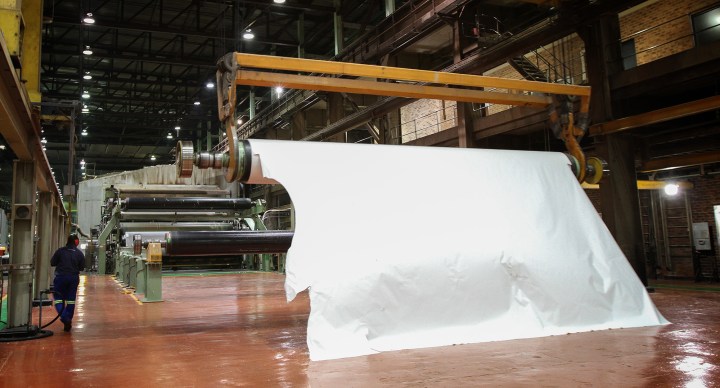AFTER THE BELL
The contribution of koala bears to the SA paper industry

The name Cecil John Rhodes is so intrinsically linked to the diamond industry that it’s a little known fact that by the time Rhodes actually got to Kimberly in 1871, there were already around 50,000 people there. How did he, out of those 50,000 people, emerge to be the chairman of De Beers, still the world’s largest diamond company?
The short answer is, it didn’t happen overnight; he was deft and creative and an extraordinary mover and shaker. He was also helped by his ice machine. He and his partner Charles Rudd bought an ice machine in London, brought it to Kimberly and sold ice to the miners. They did a roaring trade because Kimberly is searingly hot at the best of times.
How much of a difference the ice machine made in Rhodes’ ability to buy up all the rival claims at Kimberly is not clear, but it falls into the category of the “picks and shovels” theory of business.
This theory is that the big money seldom derives from the most obvious source, in this case, diamonds. At the original gold diggings in the US, for example, the people who made the most money were not the gold miners, but those who sold picks and shovels to the gold miners.
What happens is that competition drives down margins in the main business, particularly if it’s very visible and obvious. Yet, precisely because it’s so visible – and often there is an investment mania surrounding the main business – the businesses that supply the main business is where you want to be.
So, about paper.
SA’s two paper producers, Sappi and Mondi, just released their quarterly and half-yearly results respectively, and they are both absolute blow-outs.
Mondi’s earnings were up 28% off a pretty high base, and Sappi’s doubled compared to last year. Because Sappi and Mondi are both SA paper companies, and their names both end with an “i”, I suspect lots of people think they do more or less the same thing: make paper.
But actually, they are in completely different markets, and paper doesn’t have a lot to do with it anymore, with Mondi focused on packaging and Sappi in a range of paper products, but increasingly in clothes. Yes, clothes. More on that a bit later.
The “picks and shovels” analogy really applies to Mondi, because packaging is to the internet delivery market what shovels were to the gold industry. Of course, the paper industry of yore is a declining market, because magazines, newspapers and books are being replaced with digital technologies. But that same digital industry, mainly in the form of Amazon, is adding jet propulsion to Mondi’s packaging products.
Sappi’s turnaround is, if anything, even more remarkable. A long time ago, I and some other journalists were invited to lunch with the Sappi execs. I can’t say I was fantastically looking forward to it. Sappi was in deep trouble at the time after a huge acquisition spree had left the company very deep in debt. And how interesting can making paper be?
Turns out, fantastically interesting. Sappi’s pivot was to make viscose, which is the fibre made from cellulose, which comes primarily from wood pulp. So why is South Africa in general and Sappi particularly good at that? The answer is, Australian trees, mainly blue gums.
Blue gums exude a lot of gum, hence the name – useful if you are making something gummy. I remember asking the Sappi execs why, with SA’s problems with land claims and water scarcity, they didn’t start plantations in Australia? The answer was that because eucalyptus trees are native to Oz, an entire range of species have, over the centuries, adapted to live in them, including, as it happens, koala bears.
There is very little that turns off environmentalists – and shareholders – than the sight of a koala bear after it has been in an argument with a tree shredder. The fact that the trees are not indigenous to SA helps in this regard, so there’s a turn-up for the books.
Viscose competes with nylon, a synthetic fibre derived from oil; both are used on their own or added to cotton to make clothes. Both have the advantage of being easy to clean and are generally tough, though they both have the disadvantage of being kinda sweaty. But viscose is a more natural product – so more expensive suits, for example, will blend viscose rather than nylon with the cotton, adding sheen and making them hang beautifully.
In any event, the way Sappi has gradually worked its way back from the brink has really been enormously impressive.
Sappi chief executive Steve Binnie said in the company’s earnings statement that net debt – for years now, the millstone around the company’s neck – was down $525-million to about $1-billion over the past year. For a company with a market cap of $1,7-billion, that’s high but handleable.
Sappi is still a long way off the value of Mondi, but both companies are great contributors to SA’s business environment and have helped underpin the JSE.
And the koala bears are safer. BM/DM


















 Become an Insider
Become an Insider
I enjoyed reading that for the information, but more so for the story craft of it. Thank you.
Gum trees consume much more water than the native grasslands they have replaced. This has had a big impact on run off into rivers and thus on water availability and aquatic biodiversity. In nature there are no free lunches, Tim.